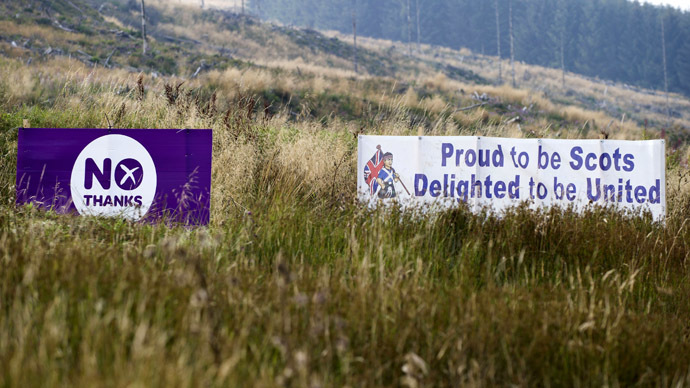Privatization Of British Health System Fuels Scottish Independence

“Yes” campaign supporters try to disrupt a gathering of a “No” campaign rally that leader of the Labour party Ed Miliband addressed, in Glasgow, September 11, 2014. (Reuters/Paul Hackett)
Politicians clashed over the National Health System (NHS) at a Scottish independence debate. “Yes” supporters say independence could save the health service from privatization, while “No” advocates say Scotland can’t afford it alone.
Independence is needed to protect against a “nasty, competitive, profit-driven motive” towards the NHS, Scottish Green Party MSP Patrick Harvie said Thursday.
Respect MP George Galloway, who is calling for a “No” vote, however, says there would not be an NHS without “a country big enough” to share resources.
The debate was held at Glasgow’s SSE Hydro arena before an audience of around 7,500 young people, drawn from secondary schools across Scotland.
The 18th September referendum will be the first time 16 and 17 year olds have been entitled to vote. Support for independence is highest among the younger population.
Both sides in the referendum race hold strong emotional attachments to the NHS. The “Yes” camp says independence would shield the health service from Westminster-imposed budget cuts and privatization.
Employees of Gordon diesel services prepare to erect Yes campaign placards on their workshop in Stornoway on the Isle of Lewis in the Outer Hebrides September 11, 2014. (Reuters/Cathal McNaughton)
“There’s a difference between being able to control policy on something like the NHS and being able to control Scotland’s finances,” said Harvie, arguing for a “Yes” vote.
“Now, right now, the UK government is dead set on breaking up and privatizing the structure itself of the NHS. If that leads in the longer term to more introduction of fees and charges, if it leads to a decline in the public resources that are going in, that will impact on the Scottish budget.”
Harvie said Scotland needed “control of its own finances and its own voice at a European level.”
Enough to go around?
The “No” camp is questioning whether an independent Scotland could afford to maintain current health spending. Galloway said the NHS would be more secure under the union.
“We would never have had a National Health Service if it wasn’t for two things: a Labour government in 1945 and a country big enough to make a big enough pot to share resources across the country in order to have healthcare free at the point of need,” said the Respect MP, who also presents his own TV show on RT, “Sputnik: Around the World with George Galloway.”
“The National Health Service is an entirely devolved matter. It could only be privatized if people were foolish enough to elect a Scottish government that was ready to privatize it.”
Galloway caused controversy in the run-up to the debate, suggesting that the BBC had tried to withdraw his invitation at the request of the pro-independence Scottish National Party (SNP). He said fellow panelist and SNP party member Nicola Sturgeon had threatened to pull out if he took part.
Sturgeon, a former health secretary representing “Yes Scotland,” said waiting for a Labour government to take power and protect the NHS was not an option.
“How many times has Scotland voted Labour to end up with the Tories?” asked Sturgeon. “Why do we have to cross our fingers and vote for a Labour government when we can vote ‘Yes’ and guarantee we always get the governments we vote for?
“I know how hard it is to protect the budget of the health service when our overall budget is being reduced by Westminster.”
Sturgeon added: “I will fight with every breath in my body to keep the National Health Service in public hands, but we are going to be more able to do that when we are in control of our own budget so that we set our own priorities.”
Pro-union banners are placed in a field in Jedburgh, on the Scottish border with England, on September 11, 2014, a week ahead of Scotland’s independence referendum. (AFP Photo/Lesley Martin)
The future of the NHS as a state-run health service is currently in question throughout the UK. Campaigners say the Transatlantic Trade and Investment Partnership (TTIP), the largest bilateral trade deal ever brokered, could lead to the permanent privatization of NHS services.
The deal could allow US corporations to sue the British government if it ever embarked on an effort to re-nationalize outsourced health services.
“If the Scottish NHS is not exempt from TTIP it will be a disaster,” said Willie Wilson, of the “NHS for Yes”campaign.
“The Scottish Government has so far protected the NHS as much as it can within the limits of the Scottish budget,” he said. “But TTIP will mean we won’t have a choice, we will be forced to open up NHS services to multinational companies in Europe and America.”
The only way to protect free NHS services was to vote “Yes,” Wilson said: “The UK Government’s position is now absolutely clear: they are not seeking exemptions from TTIP, and therefore we can only protect the Scottish NHS from privatisation by voting Yes.”



